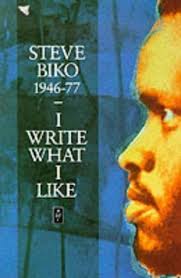In my quest to continue learning South African history from voices other than those i grew up with i was encouraged to read, ‘I Write What I Like’ by Steve Biko. Not so much a story as a collection of letters and speeches, this book is really helpful as it contains real time words, thoughts and ideas from one of South Africa’s great leaders written during the height of apartheid.
The Catholic Herald had this to say in description: An impressive tribute to the depth and range of his thought, covering such diverse issues as the basic philosophy of black consciousness, Bantustans, African culture, the institutional church, and Western involvement in apartheid.
i am still only about half way through reading the book, but there are already a number of extracts i would like to share in the hope that they will challenge your thought and hopefully inspire you to get hold of a copy for yourself to read it and try and understand some of the struggle from the other side.
Here is a passage to get you started:
Apartheid – both petty and grand – is obviously evil. Nothing can justify the arrogant assumption that a clique of foreigners has the right to decide on the lives of a majority. Hence even carried out faithfully and fairly the policy of apartheid would merit condemnation and vigorous opposition from the indigenous peoples as well as those who see the problem in its correct perspective. The fact that apartheid has been tied up with white supremacy, capitalist exploitation, and deliberate oppression makes the problem much more complex. Material want is bad enough, but coupled with spiritual poverty it kills. And this latter effect is probably the one that creates mountains of obstacles in the normal course of emancipation of the black people.
One should not waste time here dealing with manifestations of material want of the black people. A vast literature has been written on this problem. Perhaps a little should be said about spiritual poverty. What makes the black man fail to tick? Is he convinced of his own accord of his inabilities? Does he lack in his genetic make-up that rare quality that makes a man willing to die for the realisation of his aspirations? Or is he simply a defeated person? The answer to this is no a clear-cut one. It is, however, nearer to the last suggestion than anything else. The logic behind white domination is to prepare the black man for the subservient role in this country. Not s long ago this used to be freely said in parliament even about the educational system of the black people. It is still said even today, although in a much more sophisticated language. To a large extent the evil-doers have succeeded in producing at the output end of their machine a kind of black man who is man only in form. This is the extent to which the process of dehumanisation has advanced.
Black men under the Smuts government were oppressed but they were still men. They failed to change the system for many reasons which we shall not consider here. But the type of black man we have today has lost his manhood. Reduced to an obliging shell, he looks with awe at the white power structure and accepts what he regards as the “inevitable position”. Deep inside his anger mounts at the accumulating insult, but he vents it in the wrong direction – on his fellow man in the township, on the property of black people. No longer does he trust leadership, for the 1963 mass arrests were blameable on bungling by the leadership, nor is there any to trust. In the privacy of his toilet his face twists in silent condemnation of white society but brightens up in sheepish obedience as he comes out hurrying in response to his master’s impatient call. In the home-bound bus or train he joins the chorus that roundly condemns the white man but is first to praise the government in the presence of the police or his employers. His heart yearns for the comfort of white society and makes him blame himself for not having been “educated” enough to warrant such luxury. Celebrated achievements by whites in the field of science – which he understands only hazily – serve to make him rather convinced of the futility of resistance and to throw away any hopes that change may ever come . All in all the black man has become a shell, a shadow of a man, completely defeated, drowning in his own misery, a slave, an ox bearing the yoke of oppression with sheepish timidity.
This is the first truth, bitter as it may seem, that we have to acknowledge before we can start on any programme designed to change the status quo. It becomes more necessary to see the truth as it is if you realise that the only vehicle for change are these people who have lost their personality. The first step therefore is to make the black man come to himself; to pump back life into his empty shell; to infuse him with pride and dignity, to remind him of his complicity in the crime of allowing himself to be misused and therefore letting evil reign supreme in the country of his birth. This is what we mean by an inward-looking process. This is the definition of “Black Consciousness”.
From Chapter 6, titled, ‘We Blacks’ of the Steve Biko book, ‘I Write What I Like’
[For more from Steve Biko on History and Heroes, click here]
[For extracts from Robert Sobukwe’s excellent, ‘How Can Man Die Better’, click here]







[…] [For the previous passage, dealing with Black Consciousness, click here] […]
[…] [To read some Steve Biko and his focus on Black Consciousness, click here] […]
[…] [For another extract from Steve Biko’s ‘I Write What I Like’, this time on black c… […]
[…] [For another passage from Steve Biko looking at Black Consciousness, click here] […]
[…] reading up on our history from different voices to the ones i was taught – Robert Sobukwe, Steve Biko, and even Antjie Krog. I have looked to strengthen my friendships with black people i know who […]
[…] [For other passages and thoughts from Steve Biko’s ‘I Write What I Like’, click he… […]
[…] history i had. But in the last year i have been privileged to get my hands on some Robert Sobukwe, Steve Biko, Antjie Krog, Frank Chikane, and have just started reading ‘Writing Black’ by Richard […]
[…] I Write What I Like – Steve Biko […]
[…] different eyes and words and so from Robert Sobukwe ‘How Can Man Die Better’ to Steve Biko’s ‘I Write What I Like’ and ‘No Life Of My Own’ by Frank Chikane [whose son was one of the young people […]
[…] while back i shared a number of passage from the Steve Biko book: I Write What I Want. Which are all well worth checking out, as is the whole book if you get the chance. i found one […]
[…] while back i shared a number of passages from the Steve Biko book: I Write What I Want. Which are all well worth checking out, as is the whole book if you get the chance. i found one […]